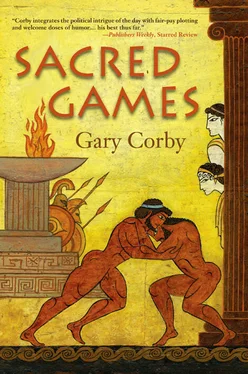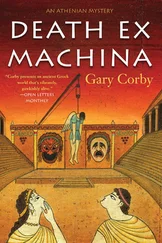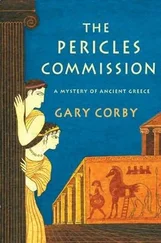Gary Corby - Sacred Games
Здесь есть возможность читать онлайн «Gary Corby - Sacred Games» весь текст электронной книги совершенно бесплатно (целиком полную версию без сокращений). В некоторых случаях можно слушать аудио, скачать через торрент в формате fb2 и присутствует краткое содержание. Год выпуска: 2013, ISBN: 2013, Издательство: Soho Press, Жанр: Исторический детектив, на английском языке. Описание произведения, (предисловие) а так же отзывы посетителей доступны на портале библиотеки ЛибКат.
- Название:Sacred Games
- Автор:
- Издательство:Soho Press
- Жанр:
- Год:2013
- ISBN:978-1-61695-228-0
- Рейтинг книги:3 / 5. Голосов: 1
-
Избранное:Добавить в избранное
- Отзывы:
-
Ваша оценка:
- 60
- 1
- 2
- 3
- 4
- 5
Sacred Games: краткое содержание, описание и аннотация
Предлагаем к чтению аннотацию, описание, краткое содержание или предисловие (зависит от того, что написал сам автор книги «Sacred Games»). Если вы не нашли необходимую информацию о книге — напишите в комментариях, мы постараемся отыскать её.
Sacred Games — читать онлайн бесплатно полную книгу (весь текст) целиком
Ниже представлен текст книги, разбитый по страницам. Система сохранения места последней прочитанной страницы, позволяет с удобством читать онлайн бесплатно книгу «Sacred Games», без необходимости каждый раз заново искать на чём Вы остановились. Поставьте закладку, и сможете в любой момент перейти на страницу, на которой закончили чтение.
Интервал:
Закладка:
Attica. The area of southern Greece controlled by Athens. Most of Attica is rural, very hilly, farmland. When Gorgo says she would cheer on her men as they laid waste to Attica, she means to the farmland that fed Athens. It was a common strategy in those days to destroy the enemy’s food production.
Aulos Pipes. A recorder-like musical instrument, but with two pipes which form a V at the mouthpiece. Music was played during some Olympic events, such as the long jump.
Bouleterion. Council house. Boule means council. Olympia had a bouleterion, which was the administration center during the Games.
Chaire!“Rejoice!” Friends who met each other on the street would call out, “Chaire! I rejoice to see you!” In the Bible-clearly at a much later date- chaire is the first word spoken to Mary by the angels.
Chiton. The chiton is the usual garment of a wealthy citizen. The chiton is a large rectangular sheet, or two sheets pinned together, wrapped around the body from the right, wide enough to cover the arms when outstretched and fall to the ankles. The sheet is pinned over both shoulders and down the left side. Greek clothing is neither cut nor shaped; there’s a lot of spare material below the arms. The chiton is belted at the waist so the extra material doesn’t flop around. The chiton is worn with a himation, a bit like a stole, across the shoulders. The chiton is for men with no need to labor. A middle class artisan might wear an exomis.
Deme. A deme is like a combination of suburb and sub-tribe. All of Atticais broken up into demes. When an Athenian introduces himself to a stranger, he always gives his name, his father’s name, and the deme in which he lives. Hence, “Timodemus, son of Timonous, of the deme Archarnae of Athens,” or, “Nicolaos, son of Sophroniscus, of the deme Alopece of Athens.”
The patronymics and the demes I used above are totally correct. This was the standard way of naming. Even in writing, there are many real people mentioned in classical sources about whom we know almost nothing, except who their father was, and where to find their house. A man took the same deme as his father.
Demeter. The goddess of the harvest. She’s also the goddess of fertility, which makes it so appropriate that Klymene is her priestess. No one knows why the priestess of Demeter had to observe the Sacred Games; not even the ancient Greeks could remember the reason, and that makes the tradition very old indeed. Some scholars have speculated that, because of this rule, the Sacred Games might have begun as funeral games to celebrate death and rebirth.
Drachma. The standard coin of Greece. The average workman earned about a drachma a day. One drachma is worth six obols. Every city minted their own coins, which created the need for moneychangers and exchange rates. At an event like Olympia, every coin imaginable changed hands in trade. It must have been chaos for the stallholders (and for the pornoitoo!).
Exomis. The exomis is the standard wear of middle class artisans. The exomis is a sheet of linen wrapping around from the right, slightly wider than the shoulders of the wearer and falling to knee length. The corners are tied over the left shoulder, which is all that prevents the exomis from falling off. This leaves both arms and legs free to move without hindrance.
Sophroniscus wears an exomis every day when he sculpts, and therefore feels uncomfortable in the more restrictive chiton. Pericles, on the other hand, wouldn’t be seen dead in an exomis. He always wears a chiton and drapes around him a himationof fine wool.
Genos. A family bloodline. It’s the same as gens in Latin, and the origin of the word genus in English. The genos Timonidae was a family in ancient Athens who produced sports stars over many generations. Timodemus and Timonous were both members of the genos Timonidae.
Gymnasium. Gymnasium is a very Greek word. I’ve used the Latin form for familiarity. The Greek is gymnasion. The gymnasium at Olympia is Roman. In Nico’s day there were very few permanent buildings, and there’s no known gym from that date. I consider that impossible, so I’ve placed a temporary wooden structure where the Roman gymnasium was later built.
To the Greeks, the gymnasium was not only a place to exercise, but also a social center and where boys went to school. Both meanings survive to the present day. In German, a gymnasium is a high school.
Hellanodikai. The Judges of the Hellenes. Dikai means judges. The hellanodikai were men of outstanding integrity who were selected to run the Olympic Games and adjudicate disputes. Considering how desperate everyone was to win, I don’t envy them the job.
Hellenes. The Greeks. They never called themselves Greek. They called themselves Hellenes. To this day, in their own language, the word for Greece is Hellas.
Hetaera. A courtesan. Diotima might not be pleased about her mother’s salacious past, but the hetaerae were high class, well educated, and capable of holding their own at the highest levels of society.
Himation. A stole or cloak worn with a chiton. The himation is made of wool and worn across the shoulders and down an arm.
Hydria. A ceramic jar used to store water. Whence all the modern words beginning hydro , such as hydroelectric.
Hippaphesis. It means horse-starter. The hippaphesis at Olympia was the world’s first starting gate for horse races. It worked as Nico describes in the book-a V-shaped device that enforced a staggered start, with the outer wings of the V going first and the apex of the V last. The hippaphesis was invented by an Athenian named Kleotas.
Hippeis. Knights. Not quite the same as medieval knights in shining armor, but it’s the same basic idea. Every city had its knights, which meant citizens wealthy enough to provide a horse when they fought in the army. The term is very ancient because by classical times everyone was fighting on foot, even the now misnamed hippeis. Some cities formalized the hippeis system, Sparta being one of those.
The Spartan hippeis were elite troops. It’s hard to imagine just how good you’d have to be, to be considered elite at Sparta. The modern SAS or Green Berets might be a reasonable equivalent. In battle, the hippeis fought in the place of honor, on the right flank, and appear to have provided a bodyguard to the kings.
The hippeis were more than that, though, because they also had powers of arrest. Herodotus and Xenophon both describe cases in which members of the hippeis were sent to bring in men accused of crimes against the state. In both cases the crime was treason. From this it’s reasonable to assume the hippeis had a role in state security.
Hippodrome. It means simply horse arena. The hippodrome is where the chariot races were held. The hippodrome at Olympia was entirely lost during major floods in medieval times, but when you look at a map of the ruins there’s an empty space in the bottom right corner where it is fairly obviously the hippodrome must have been.
Iatrion. In modern Greek it means hospital. In ancient Greek, it was more like an aid station or a doctor’s surgery. Given the state of medicine in ancient Greece, it was a good place to avoid. There was an iatrion set up at Olympia during each Games-very wise, considering the casualty rate-but it’s not known where it was. I’ve assumed it was in the most sensible spot: halfway between the stadionand the hippodrome.
Читать дальшеИнтервал:
Закладка:
Похожие книги на «Sacred Games»
Представляем Вашему вниманию похожие книги на «Sacred Games» списком для выбора. Мы отобрали схожую по названию и смыслу литературу в надежде предоставить читателям больше вариантов отыскать новые, интересные, ещё непрочитанные произведения.
Обсуждение, отзывы о книге «Sacred Games» и просто собственные мнения читателей. Оставьте ваши комментарии, напишите, что Вы думаете о произведении, его смысле или главных героях. Укажите что конкретно понравилось, а что нет, и почему Вы так считаете.












